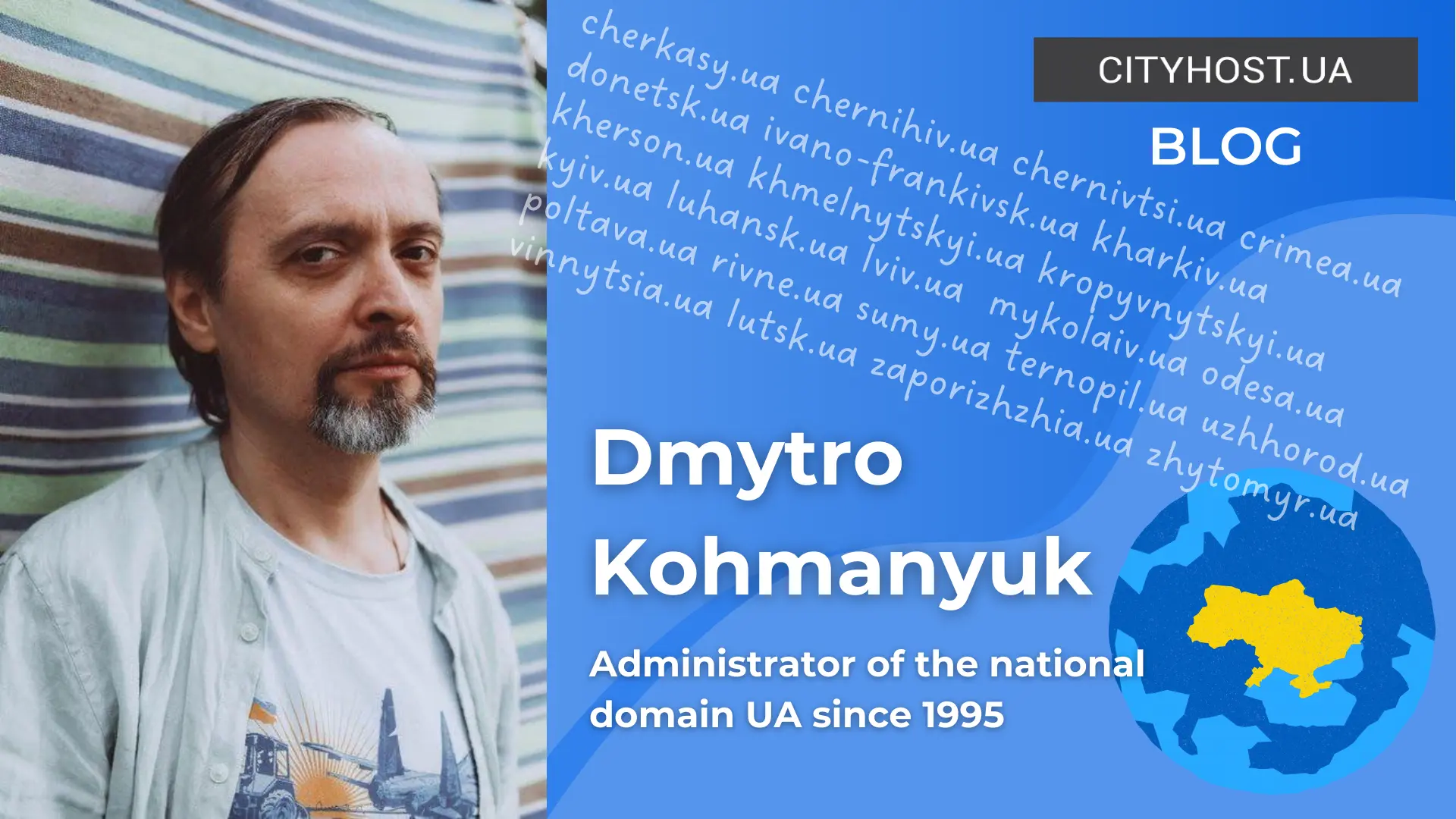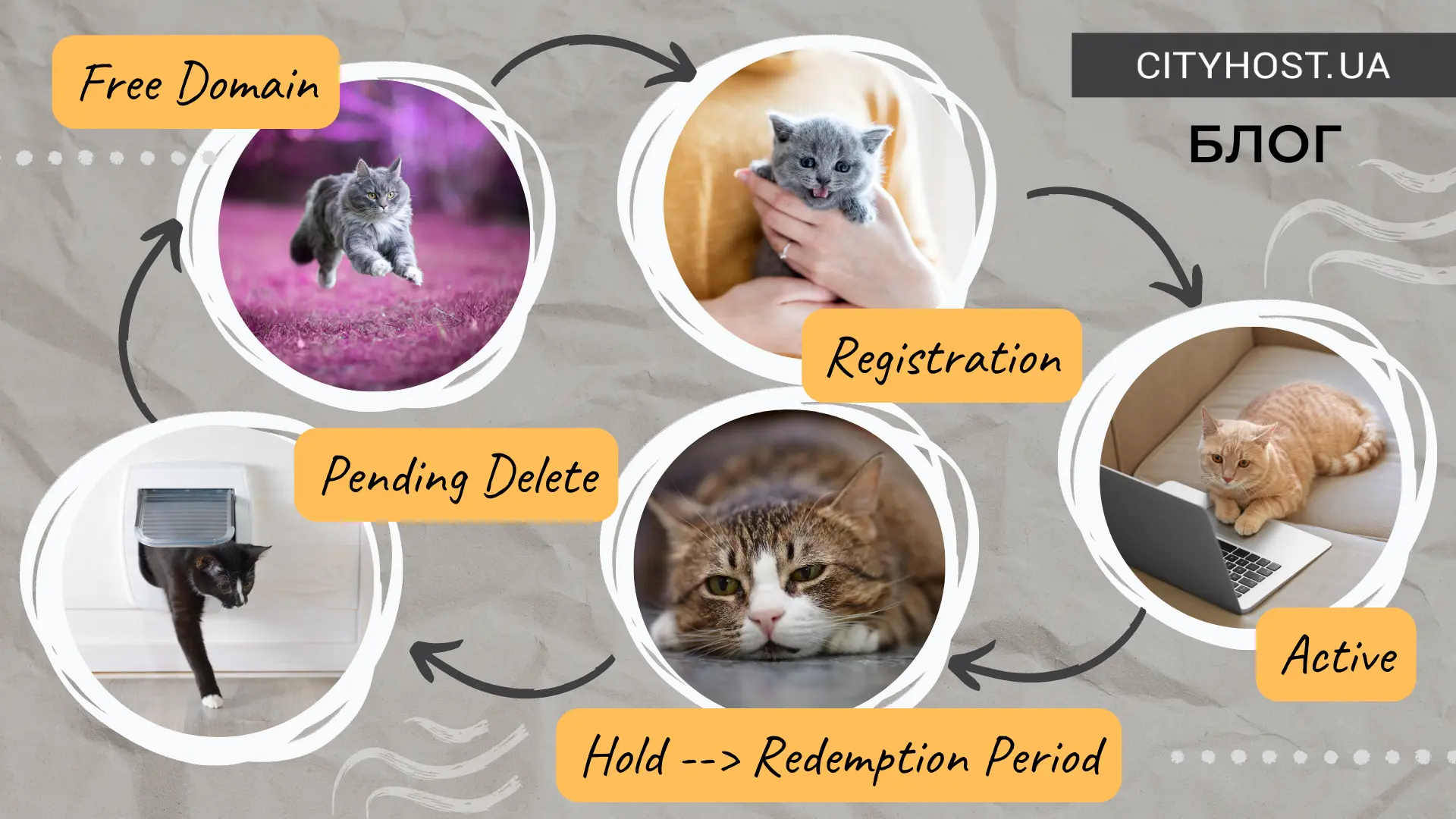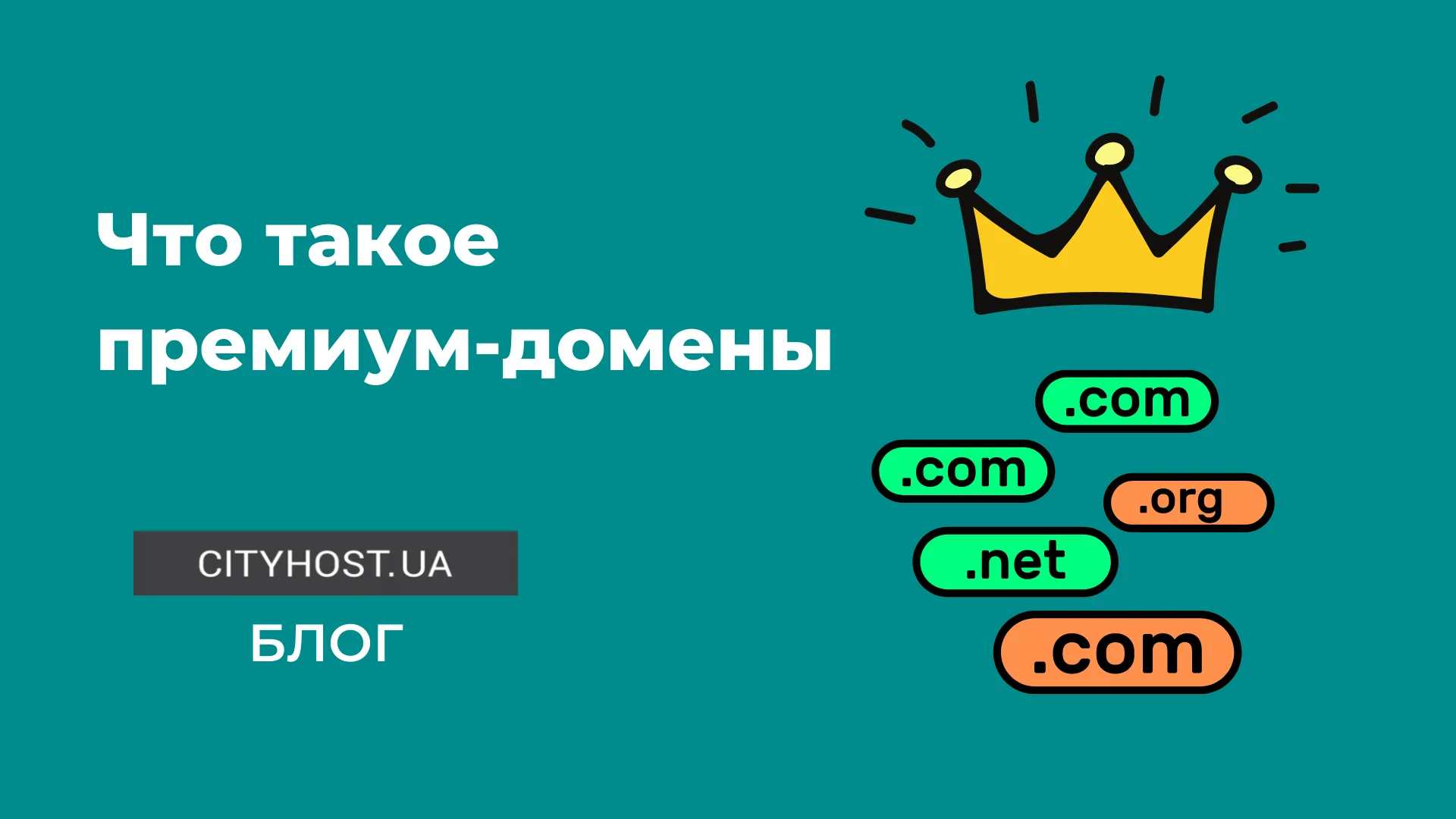
In May 2024, the registration of domains in five Russified regional domain zones — Chernihiv, Chernivtsi, Khmelnytskyi, Kropyvnytskyi, and Rivne — was discontinued. This is one of the steps towards the de-Russification of the domain system, which entered its active phase after the full-scale invasion began in 2022. If we look back at all the events that preceded this decision, they take us back to 1993, when all regional domain zones were created. Since then, many processes and changes have occurred, which should be discussed.
This article is based on an interview with the founder of Hostmaster LLC, Dmytro Kohmanyuk, who has been the administrator of the national domain UA since 1995.

The first regional domain zones were created in 1993, a month after the launch of the national domain zone UA. At that time, the current technical administrator assigned names to them — in fact, they received random names. Some of them had Ukrainian-language spellings (ternopil.ua, lviv.ua), while others had Russian-language spellings (kiev.ua, kharkov.ua).
It quickly became apparent that such a system had its drawbacks: domains named after the largest city did not cover the entire region, and there were not enough linguistic alternatives for users.
Therefore, the idea of implementing two-letter domains arose — as neutral as possible from both linguistic and territorial points of view. In 1997, two-letter domain zones were launched — for Rivne it was rv.ua, for Lutsk lt.ua, and so for most regional centers.
"There is a historical site on the domain nic.net.ua, which I created at the beginning of Hostmaster's existence," says Dmitry Kohmanyuk. "The site hasn't been updated since, but I maintain it because it contains a lot of important data. In particular, it is worth reading this document* to learn how the two-letter second-level domain zones were created."
*Viewing the site may not be supported by some browsers, such as Safari. If the site opens with errors, try another browser.
Subsequently, it became clear that not all user rights were accounted for in the system: why, for example, could a resident of Lviv register a fully Ukrainian-language domain, but a resident of Kyiv or Kharkiv could not? To balance the rights of all residents of the country, it became necessary to create Ukrainian-language domain zones for those regions where they did not exist.
On December 26, 2007, new domain zones were reserved, in which city names were transliterated from Ukrainian. The first was kharkiv.ua in the same year, and the rest were gradually introduced, with the entire process spanning 17 years. The last domain zones zakarpattia.ua and uzhhorod.ua were delegated and opened for user registration on February 1, 2024.
A brief note:
-
Reserved domain zone — technically created but not yet open for user domain registration.
-
Delegated domain zone — open for user domain registration.
The de-Russification gained particular relevance in 2022 after the start of Russia's full-scale invasion of Ukraine. As early as June, hosting provider and registrar Cityhost.ua announced an initiative to de-Russify domains. As part of the initiative, the company completely stopped registering new Russified domains and introduced discounts on all domains with correct transliteration. Additionally, Cityhost.ua CEO Oleg Rivtin publicly appealed to fellow registrars and administrators of Ukrainian domain zones to join the initiative and work on popularizing domains with transliteration based on Ukrainian city names. The initiative later evolved into a joint action by 28 Ukrainian registrars, supported by the UA domain zone administrator, and became a driving force in the process of de-Russifying Ukrainian domains.
Read also: TOP 5 Ukrainian domains for a website
In recent years, many events have occurred — administrators and registrars popularized domains through advertising and flash mobs, created instructions for easy transition to correct names, and completed the process of delegating all Ukrainian-language domain zones that had remained reserved.
At the same time, the question arose about the feasibility of maintaining names in the Ukrainian domain system that still recorded Russian-language transliterations of city names — especially given that Russia is trying to destroy us as a state.
In 2024, the process of closing registrations in Russian-language domain zones began. But in the context of these events, it is worth mentioning the "first swallow," which flew in 2023 — on June 1, registration in the communized domain zones dnepropetrovsk.ua and dnipropetrovsk.ua was stopped.
The process of ending registration is ongoing, but this does not mean that owners of existing Russian-language domains will lose them — such names will continue to be serviced in the system as long as needed. But will the Russified domain zones be completely closed, and when might this happen? This is one of the questions we asked Dmytro Kohmanyuk.
***
— How did the decision to close registration for Russified domains come about?
— After dealing with the issue of domains for nearly 30 years, I realized that it is not enough to simply give people the opportunity. You need to first provide the opportunity, and then the motivation. Unfortunately, the best motivation is negative (for example, fines). We can't use such leverage because the domain name system is based on democracy and free choice. We can inform users, provide them with discounts, run promotions.
If before 2022 we simply gave users an alternative, and they decided for themselves which domain their site would have, then after the start of the full-scale invasion, it became clear that this is a matter of managed choice. I understood that as long as we allow the creation of new Russian-language domains, we thereby allow the idea of the communization (or even re-communization) of Ukraine to live on, and the return of Ukraine to the Soviet Union, which Russia dreams of.
From 2022 to 2024, the creation of an alternative to Russified domains was completed, and then I made the decision for myself that all Russified domain zones should be closed for registration. Closing Russified domains is the minimal action that is harmless to users and at the same time stops the growth of domains that do not correspond to Ukrainian identity. We also had contact with the Ministry of Digital Transformation — from their side, there was also a wish expressed that all Russified domain zones should be closed.
— Why did you choose these five domain zones for the first stage of stopping registration?
— This internal decision was made by a group of administrators, and the decisive factor was the initiative of local administrators of specific domain zones.
The main criteria for choosing zones to stop registration were popularity (or rather unpopularity) and the size of the domain zone — for example, closing such large zones as Kyiv, Kharkiv, and Odesa could cause concern among users. Therefore, we chose the smallest domain zones, whose administrators were also ready for this. The main principles of derussification were slowness and caution.
Now we have 15 domain zones where registration needs to be stopped. 5 of them have already been closed — these are chernigov.ua, chernovtsy.ua, khmelnitskiy.ua, kirovograd.ua, rovno.ua.
We plan to stop registration in several more domain zones by the beginning of next year. Currently, we still do not have consensus regarding the zones of Kyiv, Odesa, and Kharkiv.
Read also: UA-DRP — how to defend your right to a domain
— How complicated is the procedure for stopping registration in a domain zone, and how long does it take to prepare for this step?
— This process consists of three parts — public discussion and creating the rules of the game, the administrative part, which involves making changes to regulations, and the last part — technological. A significant part of the process was public discussion because our important task was to preserve people's rights to old domains. The main work was in developing regulations and adopting implementation timelines for our decisions. The technical procedure for closing itself takes less time. It is quite simple — you just need to prohibit the procedure for creating new domains in the domain zone.
— Why did the two-letter domain zones all start working at once, while new Ukrainian-language domains were introduced gradually over 17 years?
— The delegation of each domain zone was initiated by the local community, registrars, and administrators. When a request came in for such a domain, we delegated it. Each new domain zone went through a procedure of public discussion. It was never the case that someone unilaterally decided whether a new domain was needed and what it should be like.
In 2022, I set myself an informal goal — to launch all the remaining Ukrainian-language domain zones in reserve. This goal was achieved in 2024 — there were no zones left in reserve with Ukrainian transliteration of city names, except for krym.ua and sevastopol.ua (Crimean domains are currently registered very little) and sicheslav.ua (created in anticipation of the renaming of the city of Dnipro).
— What is the principle of mirroring and why is it needed?
— We introduced the principle of mirroring for pairs consisting of the old Russian-language domain and the new Ukrainian-language domain. For example, kiev.ua — kyiv.ua, kharkov.ua — kharkiv.ua. They can only be registered by one person and only with one registrar.
Mirroring was created as an opportunity for owners of old Russian-language domains to transfer their site to the new Ukrainian-language domain. This can be done using a redirect or other methods to avoid losing traffic after the Ukrainianization of the site's address. To assist users, Cityhost.ua created detailed instructions for transferring a site to the new domain.
— Is it possible that Russian-language domain zones will be completely closed in the future and is there such a procedure? As far as I know, there are very few examples of completely deleting a domain zone in the world.
— Yes, if we look at global practice, there are very few examples of deleting domain zones that previously functioned and had registrations. Their deletion was accompanied by the disappearance of the country itself or its renaming. For example, there is the Czechoslovak domain .cs, which was closed in 1995 due to the country's split into the Czech Republic and Slovakia, and the Yugoslav domain .yu, which ceased to exist in 2010 due to the federation's breakup and the formation of several countries. We should also mention the Zaire domain .zr, which was gradually replaced by .cd after the country was renamed to the Democratic Republic of the Congo, and the zone itself was deleted in 2001. That's all, only three functioning domain zones have been deleted in the entire history.
There are still a number of domain zones that have been reserved but have not yet started working. There are also unclosed ones, even though the countries no longer exist — for example, .su (USSR), the closure of which was agreed upon but somehow forgotten and still in use to this day. Or the domain of the country Eswatini .sz — the newly formed state continues to use the old domain zone.
But the domain zone of Great Britain .gb is most similar to our current situation — due to the spread of the parallel domain .uk (United Kingdom), which has now become the main one, the .gb zone was closed for registration, but existing names in it continue to work as before.
Read also: Interesting facts about country code domains around the world
So, the practice of deleting domain zones exists, but the question is whether we have sufficient grounds and rights to delete Russified zones for cities. To delete, hypothetically, the kharkov.ua zone, there should be no domains in it — but there are currently 1300. In the kiev.ua zone, there are over 27 thousand domains. Deleting such zones is like cutting off a branch of a living tree.
If we talk about the experience of other countries, the phenomenon of a flat zone is more widespread there now — that is, only one national domain, without regional ones. We could consider this practice, but because regional domains have been operating for so long, creating a flat UA zone is currently impossible. The dispersion of domains across regional zones is also due to the fact that unlike many countries, in Ukraine, you can register a UA domain only if you have a trademark. I am sure that if there were no such restriction, users would willingly register the UA domain, and geographical zones would gradually decrease.
We will be able to discuss the deletion of Russified domain zones in a few years — there are no criteria, conditions, and procedures by which we could do this. We will address this issue later, when there is a social demand for it.
Read also: How to properly register a trademark to obtain a UA domain
***
Following this conversation, we have compiled a brief chronological overview of all the processes that took place in the national domain zone UA and leave it here.
List of all stages experienced by the Ukrainian domain system:
-
Creation of the national domain zone RU on December 1, 1992.
-
Launch of regional domains in January 1993, one month after the launch of the main national domain.
-
Creation of non-regional domains such as net.ua, org.ua, com.ua. This process lasted several years, and each domain had its own non-standard procedure for creation. The initial concepts of that time have since changed significantly. For example, net.ua was initially intended for internet providers, while in.ua meant "individual", for personal users.
-
Creation of two-letter regional domain zones in 1997, such as dp.ua (Dnipro), rv.ua (Rivne), etc.
-
Creation of new Ukrainian-language mirror domains with proper transliteration of the city. All new domains were reserved on December 26, 2007, but were delegated one by one over a period of 17 years. This stage lasted from 2007 when the kharkiv.ua domain was delegated and ended on February 1, 2024, when the domains zakarpattia.ua and uzhhorod.ua started operating.
-
Cessation of registration in Russified and obsolete domain zones. This process began with the domains dnepropetrovsk.ua and dnipropetrovsk.ua, whose registration was closed on June 1, 2023, and continues to this day.










